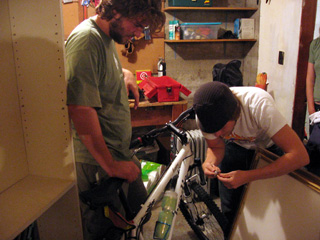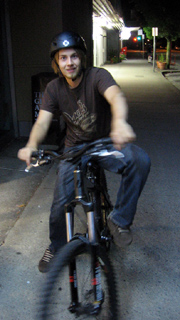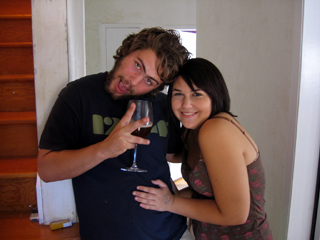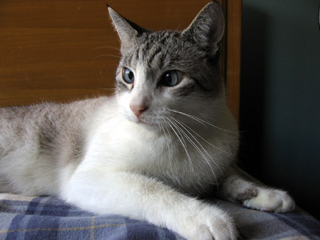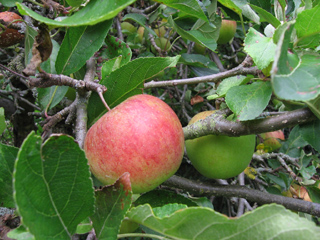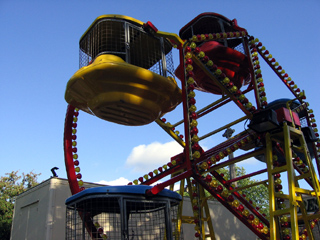I shall be off at Barrier Lake until Sunday. I hope everyone has an enjoyable weekend.
Category: Travel
My actual travels, those I aspire to, and those of others
Newly impermeable
The weather in Vancouver is stunning. So much so, and for so long, that there is a kind of thin haze obscuring the view of the mountains. Thankfully, there can be little doubt that the city will get a blast or two of cleansing rain before I depart.
Considerable progress is being made on the tasks that I resolved to complete while in Vancouver. A trip to Mountain Equipment Co-Op (MEC) with my mother, this afternoon, yielded a replacement to my venerable but now far-from-waterproof Gore-Tex coat. The successor is a really superb three-ply Gore-tex shell, which should be suitable both for general Oxford wintertime wandering and for more daring activities in the outdoors. The bright red colour should make me easier to spot. In addition, I got a few other things: a fleece vest, some shirts, and another pair of liner socks for hiking. I am now hoping for a proper Vancouver downpour: that will let me see the city in its natural state, test out my new jacket, and clear the haze that is obscuring the view of the Coast Mountains to the north.
This afternoon also involved pizza, coffee, and the taking in of ambience on Commercial Drive: a famously bohemian part of the city. It is a place to which I have to return, ideally with Sarah Pemberton or Sasha Wiley.
With my UBC accounts now expired, I have no effective means of accessing the internet for free in downtown Vancouver – which is annoying. There are a good twenty wireless networks operating around this little park beside Robson Court, but they all require WEP keys or some other form of authentication. Also irksome is the fact that the Lens and Shutter location in Pacific Centre is closed. Perhaps I will be able to make a stop at the Park Royal location later tonight, amidst the assembling of food and gear for Cabin Fever.
Having just realized how prudent it would be to bring bathing trunks to an event where water skiing is probable, I have another item to track down.
Up for two days, on the ground running
Soft water! Phone numbers with the right number of digits! Friends and family members long unseen. The visit has been going very well so far. I spent a few hours with Nick, Jonathan, Topher, and Emerson – engaging in our endless habitual pursuits of conversation and the consumption of food and drink around his most welcoming house. I have also begun ticking my way down the list of essential tasks that I set out before leaving.
I expect that blogging while here will largely consist of short posts accompanied by an unusually large number of photos including people.
PS. Forgive me, but my keeping track of other people’s blogs will be somewhat lax during the time of my stay in Vancouver. I am sure people will understand. 236 posts have come online among the various blogs I read, just since I left Oxford.
PPS. I was quite astonished by how nice the international arrivals area of the Vancouver International Airport is. After leaving Gatwick, it is like stepping into another world. As such, it is a really excellent introduction to our city, for those arriving the first time.
Back in view of the Coast Mountains
After a long but favourable trip, I am back in North Vancouver. Returning to Vancouver after a year feels like putting on a properly tailored coat that you haven’t worn for a while: it makes sense immediately, and there is considerable pleasure to be derived from that fact.
I am off to explore the neighbourhood. Vancouverite friends, please call me. Temporary cell phone information pending.
Homeward bound
Thinking back over this year spent in Oxford, the most valuable aspect of it has definitely been those who I met. That is a definite continuity with Vancouver, as it is the people there who are the reason this return trip is so exciting and desirable. Having the opportunity to spend two weeks with Vancouver family and friends, followed hard upon by a return to Oxford at the same time as so many people will be returning for the resumption of classes, is an appealing social cascade.
While it may exaggerate my studiousness of late just a bit, it still seems apt to think about this trip as the temporary abandonment of the Tree of Knowledge in favour of the Tree of Life. Barring any serious delays, I will be in Vancouver by about 9:00am Pacific Standard Time.
People in Vancouver who want to get in touch with me should email me or call my parents’ house. I will try and sort out a cell phone for while I am there, but the feasibility of that plan will be determined by how well the cost matches the benefit over my relatively brief time in the city.
Leaving Oxford in 36 hours; reaching Vancouver in 53
My flight to Vancouver leaves Gatwick at 5:55am GMT on Wednesday, which is actually 9:55pm of Tuesday in Vancouver. Assigning three hours to the bus ride and three more to be sure of clearing security on time, I will be leaving Oxford – suitcases in tow – at midnight local time tomorrow. While that is setting up England-Tuesday / Canada-Wednesday to be a kind of uber-day, such is the character of the flight plan. I just hope that my brain is back on its bearings by the time we will be leaving for Tristan’s cabin on Friday morning.
Everything from now until Tuesday night is likely to be about consolidation. Packing, organizing, and otherwise preparing. The prospect of the forthcoming journey is an exciting one, indeed.
[Unrelated, but unfortunate] Steve Irwin, the self-styled ‘Crocodile Hunter,’ was killed by a stingray in Queensland today. He was frequently a model for characters generated by the Handsworth Improv Team, in which both of my brothers performed for years, and generally struck me as a decent sort of fellow. My sympathies to his family, friends, and two young children.
On Esperanto
One of the world’s more interesting examples of a market failure is the general inability of Esperanto to secure its intended role as a universal second language. If a great many people spoke Esperanto, it would be reasonably worthwhile to devote one’s time to learning it. Knowing that there was even a 30% chance that a random person encountered in Estonia or Italy or Japan would speak it, the energetic traveller or businessperson would have a pretty good incentive to learn at least a bit. If few people do, conversely, it is not worth anyone’s time. This is what economists call a network effect: having a fax machine when nobody else does is not very useful. Likewise, having a telephone or internet connection. The more people subscribe to any such network, the more valuable the network becomes to everyone. Such networks tend to explode in usage once they cross a critical threshold of popularity. Since the development of a base of speakers generally depends on such individual choices, it remains perpetually stuck at a low level of usage.
The idea of an invented universal second language is appealing for many reasons. While English has certainly emerged as a world language, it is not without significant cultural baggage. The forces that spread English – from the British empire to American ascendancy and the dominance of English cultural and technological materials – are inevitably connected with structures of dominance and submission in the world. While Esperanto does borrow from other languages, it seems sensible to say that it is free of at least a good portion of this kind of baggage.
Another serious issue related to second languages is how quickly they shrivel when not used. Much as I would like to avoid forgetting French, it is very hard to maintain in the absence of a need to use it. My French has never really been good enough to read French newspapers or literature without the aid of a dictionary. Now, in an environment where I am virtually never exposed to the language, my knowledge is fading quickly indeed. If everyone spoke one common language, it is quite likely that you would be exposed to it often enough to gain and maintain facility in its use.
The message is simple, then: Rest of the world, please learn Esperanto. Once two billion or so of you have, I will set upon the task myself.
PS. I promise this will be the last post during this slightly over-active day of blogging.
GSM phone, UK to Canada
This post is on cell-phone migration, and probably not of interest to many people. If you know about GSM compatibility issues and Canadian cellular providers, please have a look. Continue reading “GSM phone, UK to Canada”
Counting down
In less than 100 hours, I am leaving for Canada. I am really quite exceptionally excited. Amazing how a year’s isolation from a familiar city and a much appreciated group of people can turn that place into the most desirable travel destination in the world.
Additional suggestions for the growing list of things to be done while in and around Vancouver are welcome.
Desert Island Discs
A friend of mine challenged me to come up with the collection of items that I would submit to ‘Desert Island Discs’ – a British radio show in which interview subjects are questioned about what they would bring along to soften the experience of being stranded on a desert island:
“Created by Roy Plomley in 1942, the format is simple: each week a guest is invited by Sue Lawley to choose the eight records they would take with them to a desert island.
The discussion of their choice is a device for them to review their life. They also choose a favourite book (excluding the Bible or other religious work and Shakespeare – these already await the “castaway”) and a luxury which must be inanimate and have no practical use.”
First off, I must complement the erudite Gideons who have already stocked the world’s islands not only with Bibles, but also with Shakespeare’s works. Am I allowed to bring Paradise Lost or a book with spiritual importance for me as my “Bible or other religious work?”
Music
Starting with the choice of musical albums, this is no easy matter of selection. I have 667 albums in iTunes alone, and this is a time at which the term ‘album’ is rapidly losing meaning. Thinking about, for instance, how often artists have taken to re-organizing, re-mixing, and re-combining their tracks, the medium of album is becoming more like that of the playlist, of which I have only a few dozen. Of course, each of those is rather too long to fit on a CD (even as data files) and would most definitely not fit on a record, so I am back to the contemplation of albums.
One natural way to proceed would be to choose eight critical artists and then simply select either their best work, or the work that you think would stand up best to very frequent re-listening. In the interests of fairness, I will treat two-disc albums (such at Tori Amos’ To Venus and Back or the Smashing Pumpkins’ Mellon Collie) as two albums, if chosen.
I have long treated music partly as a mechanism for altering moods. Given the dire desert scenario, it seems wise to think that way when planning.
In no particular order, then, my albums would be:
- Jason Mraz – Live at Java Joe
This quirkly live album has an unusual ability to cheer me up, despite the fact that I have heard it so many times I know not only the words, but the timing of all the instruments, by heart. I expect this will be true of all the selections. This is a somewhat difficult thing to choose, because I think five of the thirteen songs are no better than mediocre, but I am going to stick with it for the moment. - Spirit of the West – Save this House
When going mad in the heat, it seems to me that it would be important to have some record of where you came from. Since Spirit of the West is from Vancouver, they get one such point. Given that they are a band and a style of music introduced to my brothers and I by my father when we were children, they get another. The fact that it’s an excellent album in and of itself cements the choice. - The Doors – The Doors
Choosing which Doors album to bring is awfully difficult. This is one of those situations where playlists are superior to albums. Likewise, it seems inappropriate to choose one of their many ‘best of’ collections. Despite the absence of some of their best songs, I would have to go with their 1967 debut album. - Simon and Garfunkel – Bridge over Troubled Water
Choosing a S&G album is even harder than selecting from among those of The Doors. Practically each has a song or two I would put on my own custom desert island disc. Choosing from among their original albums, this would be the one. - Idan Raichel – Mimamakayim
Bringing at least one album that isn’t in English seems well advised, and this is probably the best one I have heard. While I may not be able to speak a word of Hebrew at the moment, perhaps hundreds of hours of desert island listening would elevate my consciousness – or my imagination – to the point where I think I know what it is about. Even if such a thing doesn’t happen, it can be treated as a piece of classical music with an unusually versatile and emotionally engaging instrument. - Led Zeppelin – IV
This is an album that I feel myself growing into, to some extent. When I first got it, ‘Stairway to Heaven’ was the only song I could stand, and then only the relatively melodic bits. I would bring it in hopes that my steadily growing appreciation for the album as a whole would mature. I am almost tempted to bring an album that I flat-out do not like, but which friends rave about, but unfortunately haven’t the space for such an experiment. - Pink Floyd – Wish You Were Here
Not their longest or most celebrated language, I think it is their most sophisticated and intriguing. There is no denying that one would have time to sort out all the complexities given days and weeks. - Tori Amos – To Venus and Back (Live Disc)
All my friends will have seen this one a mile off. While I maintain that Tori Amos is a musical genius in general, she is especially capable as a live performer. While a recording cannot capture the energy of a concert, this one does an appreciable job.
Naturally, lots of albums were very close to making the cut. It is not necessarily that I think these are my eight best albums – the circumstances of where they are to be enjoyed have been taken into consideration. I have intentionally not considered classical or opera albums, because that would make the selection too daunting.
Book
This is a tough one indeed. The first obvious choice is between taking something you have read and enjoyed or bringing something new. I would opt for the former. Chances are, you will read this book many times. As such, however many times you read it before arriving will soon be trivial. Out the window goes Ulysses, then, which I have tried to read four times but never managed to progress more than fifty pages into.
I am fairly sure attempts to bring something like The Encyclopedia Britannica would defeat the purpose of this exercise, but if I could bring a really massive reference book on scientific, literary, and historical themes, I would definitely do so. I have always wanted an undisturbed chance to brush up on classical and art history, music, botany, and the many other topics about which I know little or nothing.
Given the length of time, the book should be a thick and complicated one. Much as I adore Lolita, it really doesn’t have the kind of physical bulk a person would want for a desert island book. In the end, I think I would go with Anna Karenina. I’ve only read it twice, so there is plenty of depth into which I could yet descend. Also, there might be a good market for an autobiography of someone who slowly went mad reading Anna Karenina, provided he is at some point rescued in a condition sane enough to write subsequently.
Luxury
To me, this is by far the least important. Luxuries are not useless items, but useful ones that are unusually fine. A fancy pen is a comprehensible luxury, as is a fine meal or expensive audio equipment. I assume, if I am being allowed to bring albums, that the audio gear is provided and acceptable.
Ultimately, I think I would choose a musical instrument. I have never learned to play one, and have long wanted to. Naturally, doing so alone on a desert island is not ideal. I would have no scores, no instruction, and no audience. Nonetheless, it would certainly help pass the time – and perhaps express the many longings and madnesses that are certain to arise in such a place. As for which one, the relevant considerations would be resistance to sun and sand, and a low need for maintenance. Anything that needs tuning or new parts is out. Given that I cannot think of any instrument that I would trust to survive the conditions and trust myself to learn, I am abandoning this idea in mid stride. The idea of myself stranded with a clarinet that I have no idea how to play is actually quite heartbreaking.
No musical instruments, then. Writing materials are both useful and not a luxury (at least in this day and age). A fruit tree would be both useful and animate, while the same goes for an olive bush.
Perhaps the thing to bring along is a corrosion resistant razor of a variety that will not dull for many years. In the first instance, it would provide a daily ritual that would help in the recording of the passing of time. In the second, imagine the surprise of your rescuers when they find you clean-shaven and very well versed in Shakespeare!
[Update: 25 February 2007] Since so many people were looking for them, some Idal Raichel lyrics translated into English have been added.

